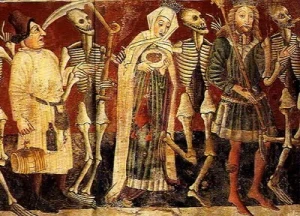Ever feel like you’re stuck living the carnival life? The origin of the word carnival derives from Latin to describe a festival of unrestrained indulgence before depriving oneself of pleasure, particularly meat, just before the start of the Lenten season.
It’s like a night out at the County Fair. Who can resist browsing the midway – the lights and sounds, the aroma of funnel cakes and bacon-wrapped corn on the cob. Then there’s the irresistible lure of crazy amusement rides. The Ferris wheel, bumper cars and the dizzy tilt-a-whirl, so much fun it’s worth the risk of puking on yourself or someone else the corn dogs you ate ten minutes ago.
Who can pass by the game booths? Just throw a couple balls at a clown figure and win that big stuffed panda for your kid. I’ve lost more than a few bucks and my manly honor trying that scam.
Eventually though it’s time for the long walk in the dark through the parking lot to the car, to go back home to real life. Back to piles of laundry and bills, the job that sucks, the strained relationships, into an unknown future.
The story of this Carnival Life may be one way to portray our desperate effort to somehow medicate ourselves out of the real life of desperation and the struggles we face. But this is the physical plane we all live on. There is, however, another dimension, the unseen spiritual realm, just as real as the physical. Mystics, seers and tarot card readers would have all gone out of business long ago without cashing in on an innate yearning to find answers to the meaning of life. It seems to remain an ever-present popular arena of speculation, with cable programs featuring investigations into the paranormal, literally the “alongside” normal. Religion wouldn’t be what it is without teaching about faith in something beyond this tangible world.
Every civilization throughout history has made its own unique effort to deal with the possibility of whatever lies beyond this visible world, through myths of deities and greater powers controlling the universe and our destinies. How do we know what’s true, dependable, and life altering enough to rescue us from the doom of fear and despair?
What’s your answer? It can’t be sex, drugs and alcohol, or the endless pursuit of selfish gratification. That’s the Carnival Life.
Here’s what I have discovered, after my own long search for worth and significance, for an answer to what lies beyond the grave. My personal relationship with Jesus Christ gives meaning to not only my temporal life now but to the eternal to come. As recorded in John’s gospel, He said “I have come that they [who believe in Me] may have life.” (John 10:10) Written in Greek, the word there for “life” is “zoe” and it means so much more than being alive, which would be “bios,” or more like just biologically surviving. It conveys rather the meaning of the best, fullest, vital, most satisfying life. It is what Adam and Eve were to enjoy before eating from the forbidden tree rather than the tree of life. We all know how that went.
Real life is more than a life style. It is a Person. My suggestion to you is stay away from the carnival, stop feeding on the world’s enchanting entertainment and junk food. Jesus said “I am the bread of life. Whoever comes to me will never go hungry, and whoever believes in me will never be thirsty.” (John 6:35) The trials and struggles we face will not go away, but He will always be “The Way, the Truth and the Life” through every inevitable trouble. That’s a promise. (John 14:6)












